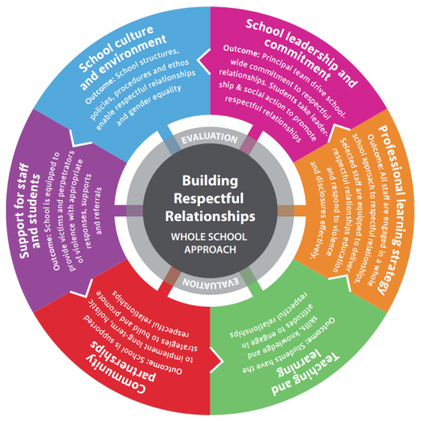RESPECTFUL RELATIONSHIPS
|
The Royal Commission into Family Violence identified the critical role that schools have in creating a culture of respect, aiming to change Australia’s story of family violence for future generations. In 2016, Respectful Relationships education became a core component of the Victorian Curriculum and is now a mandated part of the curriculum in all Victorian schools.
The Respectful Relationships program supports schools and early childhood settings to promote and model respect, positive attitudes and behaviours. It teaches our children how to build healthy relationships, resilience and confidence. Respectful Relationships education is a core component of the Victorian Curriculum from Foundation (Prep) to Year 12. It is all about embedding a culture of respect and equality across the entire school community. The Resilience, Rights and Respectful Relationships (RRRR) lessons guide the teaching of Respectful Relationships in schools. The resources have been developed by experts from Deakin University and the University of Melbourne. These age -appropriate resources support curriculum delivery and include lesson plans and activities. These help students learn and practice social skills and apply them in a positive way to learning, life and relationships. There are 8 topics addressed every year from Prep to Grade 6, including:
Click on the files below to access the RRRR learning materials for each year level.
|
Bellbridge Primary School has been implementing the Respectful Relationships program since 2018. Since 2019, we have been working as a ‘lead school’ in this area, supporting other schools through the implementation of this program.
The Respectful Relationships program acknowledges that to drive real change, a whole school approach is essential. Classroom learning needs to be reinforced by what is modelled within the school community. Taking a whole-school approach is about embedding a culture of respect and equality across an entire school community, from our classrooms to staffrooms, sporting fields and social events. This approach leads to positive impacts on students’ academic outcomes, mental health, classroom behaviour and relationships. The whole school framework consists of six core elements:
| ||||||||||||||||||||||||



